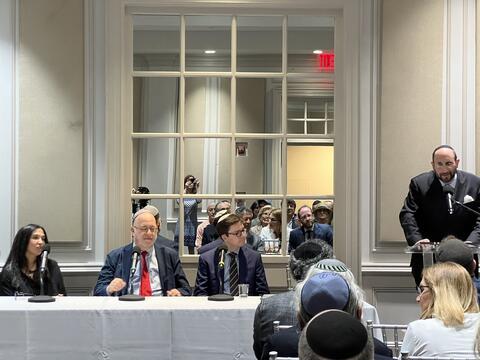On May 7th, the Zahava and Moshael Straus Center for Torah and Western Thought of Yeshiva University hosted its annual Rabbi Allan Mirvis Lecture, which took place at the Fifth Avenue Synagogue in Manhattan. The event, titled “Antisemitism, the Media, and the Jews,” drew a compelling dialogue among some of the most notable voices in Jewish media: John Podhoretz, editor of Commentary Magazine; Alana Newhouse, editor-in-chief of Tablet Magazine; and Elliot Kaufman, letters editor at the Wall Street Journal. Straus Director Rabbi Dr. Meir Soloveichik moderated the event.
The evening began with a private reception with Rabbi Soloveichik, Ted Mirvis, Moshael Straus, the panelists, and other supporters of the Straus Center. Attendees mingled with Straus Scholars and other community members and friends.
The main event, with over 130 attendees, began with remarks from Rabbi Soloveichik, who memorialized Rabbi Allan Mirvis as a Jewish leader who “bridged the world of the Yeshiva with the world at large.” His reflections were followed by an introduction from Ted Mirvis, the event’s sponsor. Mirvis highlighted the double standards facing Jews in the fight against antisemitism, particularly in the wake of October 7th. He denounced those who continue to deny the atrocities that took place, and he called on the audience to continue to fight against the hypocrisy and hatred being leveled at Jews in America and in Israel.
Alana Newhouse was the first panelist to speak. She highlighted the growing disconnect between the media portrayal of the Israeli-Palestinian conflict and genuine public opinion, noting that “this is a sign that the media is losing influence in this day and age.” She challenged the audience to reconsider their allegiance to influential institutions like Harvard that have become “havens” for antisemitism, asserting, “antisemitism is not a cause; it is a symptom.”
John Podhoretz agreed with Ms. Newhouse. Referring to the ongoing anti-Israel encampments on college campuses, he noted the clear coordination of these efforts and the role of foreign money in fomenting the unrest. “This cannot have happened organically,” he argued. “There is something much more pernicious going on. Islamist radicals have bought insurance in the US - they have bought off universities like Columbia, Penn, MIT, and Northwestern. They say ‘Death to America’ and deface World War I memorials. This is the culmination of that effort,” Podhoretz explained.
Elliot Kaufman highlighted the unique relationship between America and Israel, asserting that “America is Israel’s last hope.” Like Newhouse and Podhoretz, he argued that the antisemitism on campus is not actually coming from American society writ large, but he warned of the dangers that continue to arise without strong civic leadership. “In the absence of leadership,” he lamented, “relatively small groups can push harder and get their way. Leaders are needed.”
The panelists then discussed the responses needed from the Jewish community in the face of these challenges. “Where do we go from here?” Rabbi Soloveichik asked. The panelists debated the effectiveness of Jewish advocacy efforts versus more direct political actions. Podhoretz notably expressed skepticism about strategies targeting legacy institutions: "Do we want to save the Ivys? No! Do we want to save the media? No! Twenty billion dollars has gone to American universities from Qatar. Congress must stop this." “Jews like to embrace powerlessness,” he concluded, “but we need more Jabotinskys.”
Newhouse considered the challenges of the “technological revolution” colliding with the rising tide of antisemitism. “[The technological revolution] has changed every single cell of everything that we do. Everything has been impacted. Some people try to see what the Jews have done to survive this change. We still live in communities and have babies. We are perceived as cheaters [because of this] ,” she noted. But she ended on a positive note: “We have something to give the world. Let’s take advantage of it.”
In his concluding remarks, Kauffman explained that he was grateful for the privilege to wear a kippah and write about Israel for the Wall Street Journal’s editorial page. With regard to antisemitism, “every generation gets its own wake-up call,” Kauffman reflected. “You could hardly imagine something more hideous than Oct. 7th. Surely people would rally behind Israel. People did not. This is clarifying for American Jews. This is about the Jews. And it will be up to the Jews to confront it,” he argued.
This event was hosted in coordination with the Straus Impact Office. Attendees included representatives from the Paul E. Singer Foundation, The Manhattan Institute, and Tablet Magazine. The Impact Office aims to further the impact of Straus alumni, current Straus Scholars, and other students involved in politics, policy, and journalism on both of Yeshiva University’s undergraduate campuses. You can learn more about the Straus Center and the Straus Impact Office here.

